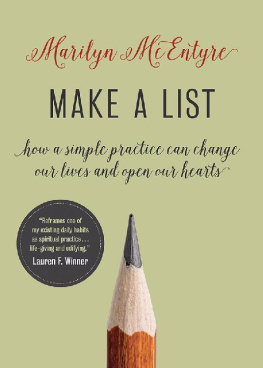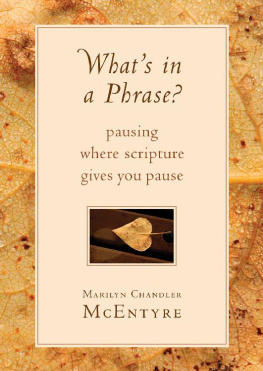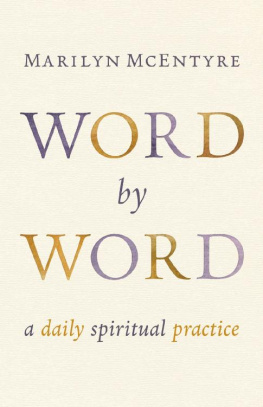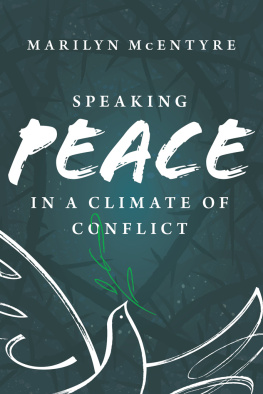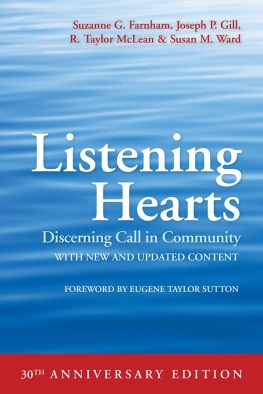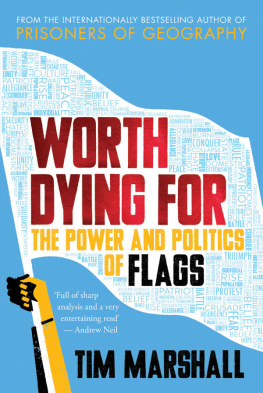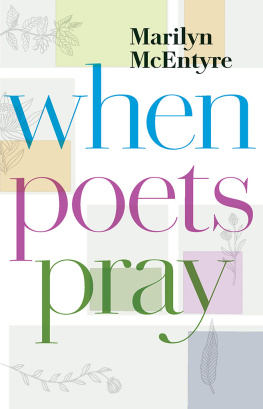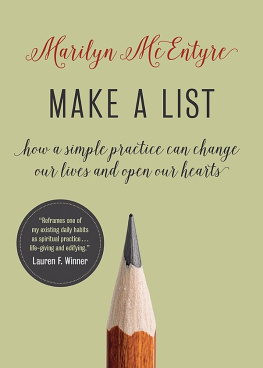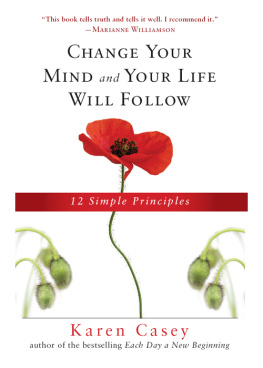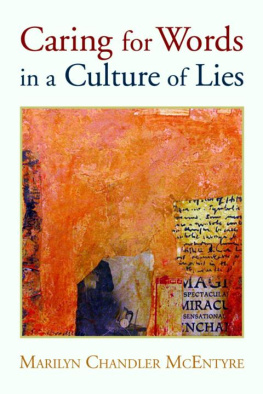
MAKE A LIST
How a Simple Practice Can
Change Our Lives and Open Our Hearts
MARILYN McENTYRE
WILLIAM B. EERDMANS PUBLISHING COMPANY
Grand Rapids, Michigan

WM. B. EERDMANS PUBLISHING CO.
2140 Oak Industrial Drive N.E., Grand Rapids, Michigan 49505
www.eerdmans.com
2018 Marilyn McEntyre
All rights reserved
Published 2018
27 26 25 24 23 22 21 20 19 181 2 3 4 5 6 7 8 9 10
ISBN 978-0-8028-7574-7
eISBN 978-1-4674-4959-5
Library of Congress Cataloging-in-Publication Data
Names: McEntyre, Marilyn Chandler, 1949-author.
Title: Make a list : how a simple practice can change our lives and open our hearts / Marilyn McEntyre.
Description: Grand Rapids : Eerdmans Publishing Co., 2018.
Identifiers: LCCN 2017039681 | ISBN 9780802875747 (hardcover : alk. paper)
Subjects: LCSH: Spiritual life. | Self-actualization (Psychology)Religious aspects. | Lists. | Success. | Change (Psychology)
Classification: LCC BL624 .M39655 2018 | DDC 204/.4dc23
LC record available at https://lccn.loc.gov/2017039681
For the people who keep me on their prayer list
and their contact list.
For the people who distract me from the to-do list
and the people who help me get through it.
And for all the people on my A-list,
whose names are inscribed in my heart
the whole long list of you.
You know who you are.

CONTENTS
Lists serve a surprising variety of purposes. Here are a few reasons to make them. 
To get at the questions behind the questions
There arent many rules in list-making, but there are reliable ways to make lists useful, beautiful, and fun. Here are a few to try out.
Things to do to the to-do list:
Exploring priorities and intentions
How to do almost anything:
How how-to lists help you learn how
Playing favorites:
Lists that clarify values
The wonder of word lists:
How word lists empower, educate, and amuse
Allowing lament:
How lists open a space for sorrow
How a list becomes a poem:
Lists that work in ways you hadnt planned
How a list becomes a prayer:
When lists lead you to your longings
A long second look:
Lists that teach you how to look again
Memento mori:
Lists that commemorate
Switching lenses:
Lists that reframe
Better than a punching bag:
Lists that open a safe space for anger
Lists for life review:
How lists help focus the backward glance
Cracking open clichs:
Lists that get behind the surfaces
Wanting what you want:
Lists that identify unidentified desires
Talking points:
Lists that illuminate your message
Thin places and sacred spaces:
Lists as guides to path-finding
Love letters:
Lists that count the ways
Litanies:
Lists that help you relax into prayer
Summary statements:
Listing for retrospection
Lists are a way of opening up play space. This section is an invitation to playto tinker with each others lists, to use the ones provided here as templates for your own, to move lines around and change the mood and marvel at your own ingenuity. Consider, as you read these lists and the short reflections that follow each of them, where whimsy, need, poetic inclinations, and playful imagination might take you. 
Appendix:
A Few Final Lists for Your General Enjoyment

I list a lot. And Im not alone. In the course of many kitchen-table conversations, Ive discovered that we keep lists for a variety of reasons. People make lists to get organized, to plan the day, to set priorities, to clarify pros and cons as they make decisions, to explore their feelings, to dispel mental fog, to articulate goals, to identify their deepest hopes and purposes.
What Ive also discovered about lists is that every time I make one, I learn something. Things come up. Sometimes it seems that the less I plan or try to foresee what might belong on a list, the more I find out. So I just start in: Things to do before the weekend; Possible blog topics; People to get back to; Nagging anxieties; Things Im grateful for. Even if the heading seems rather ho-hum (Things to do) or borders on clich (Things to be grateful for), the process brings surprises.
If I stay with it long enough to get beyond the obvious (buy the groceries, return the phone call, check e-mail, get the oil changed...), something not so obvious occurs, and the list shifts from list to something more: take a walk by the river with no phone; pick up protein bars to keep in the car for homeless people; write to a grandchild about his science project. And I discover not only what I think I need to do, but what I want to do, what Ive avoided doing, and what I dont do because I dont really want to.
This is important information. In the process of making a list, I generally find that I can, as a therapist used to advise, go to the place in me that knows. Line by line, I can take myself there. Its a place of deep, lively, sometimes amusing, sometimes daunting encounter with the self and, often, encounter with the indwelling Spirit who is more present, available, reliable, and forgiving than we may think.
When you make a list, if you stay with it and take it slowly, take it seriously but playfully, give yourself plenty of permission to put down whatever comes up, you begin to clarify your values, your concerns, the direction your life is taking, your relationship to your inner voice, your humor, your secrets. You discover the larger things that lists can reveal.
Lists are mirrors. When you look at what youve written down, no matter what the content, a list shows you something about what has come to matter to you. Even if a phrase or a line occurs to you because you like the way it sounds, because its funny, or because of what seems a random, interruptive thought, its worth paying attention to. Listing, because it takes away a certain pressure to make sense, allows space for all associations. And whatever shows up, as in dreams, probably matters.
Lists are a way of learning. E. M. Forsters famous question How can I know what I think until I see what I say? remains an encouragement for writers to write and provides a lively incentive to undertake even the humble task of making a list. List-making almost always leads to surprises. We find ourselves remembering a scene or recognizing a problem or identifying a hope that hadnt occurred to us until that moment. Writing down one sentence or phrase or sometimes even a single word opens a door and invites whats been held just below the boundaries of consciousness to come forward. Those surprises are key learning moments. We learn a little more about ourselves, our values, the changes that are occurring in this season of life. We also recognize fluctuations of feeling as we add things to the list that make us aware of desires, inhibitions, anxieties, currents of restlessness, and curiosities we hadnt noticed before.
Next page
